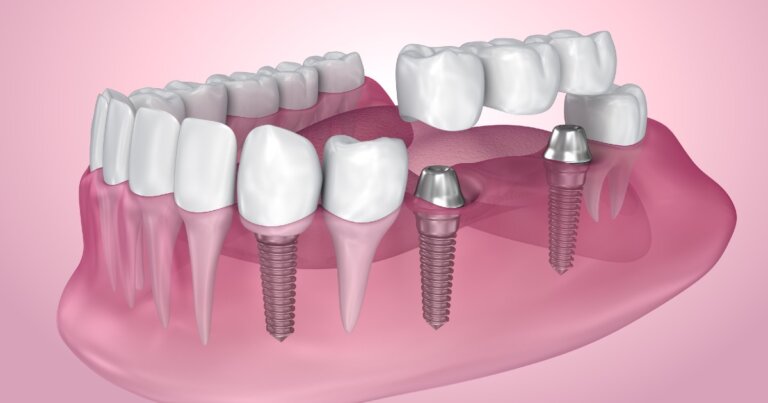Dental Implant Surgery Post-Operative Instructions

What You Should Do After Your Dental Implant/Bone Graft Surgery
A Dental Implant is a titanium screw-like root that gets inserted into the jaw bone. A prosthetic crown (cap) is then attached on top of the “screw” that will look, feel and function like the natural tooth. After dental implant surgery, it is important to follow these post-visit instructions to ensure an uneventful recovery period.
If you have not had your dental implant appointment yet, please read our pre-visit instructions.
Bleeding issues
- The implant/graft is acting like a plug to stop bleeding. Slight bleeding can be expected for the first and second day following surgery. If you notice some minor blood in your saliva (saliva is slight pink in colour), do not worry. It is okay to swallow your own saliva; you will not get sick.
- If bleeding is heavy, apply one to two pieces of wet gauze (that your dentist gave you) over the ridge and apply firm finger pressure on either side of the ridge (from the cheek-facing side, and the tongue/palate facing side). Do not apply pressure on top of the implant/bone graft, as this will disturb the stitches and increase the chance of implant/bone graft failure.
- If the bleeding does not stop and appears to be a lot, you should call your dentist or seek the hospital emergency room for help.
Avoid irritating the healing area
- Avoid forceful movements in the mouth, such as spitting, sucking through a straw, or vigorous rinsing, for the next few days.
- If you have to expel liquids from your mouth, allow liquids to drool out over a sink.
- The goal is to not disturb the stitches/implant/graft for maximal healing.
Sutures
- If the dentist placed dissolvable sutures, they will fall apart on their own after 1-2 weeks; no further action is required. If the sutures are non-dissolving, you will have to return to have them removed.
Pain Control
- It is normal to feel pain immediately after dental implant surgery.
- You are also welcome to use over the counter pain relievers such as ibuprofen (Advil) or acetaminophen (Tylenol). Ask your dentist what dosage is right for you, but if you do not have a pre-existing medical condition of allergies, 1000mg acetaminophen (Tylenol) with 600mg ibuprofen (Advil) every 4-6 hours or as needed is a very powerful combination.
Swelling
- Swelling may occur over the course of 48 hours after oral surgery. To minimize swelling, place an ice bag or bag of frozen peas (wrapped in a towel) over the cheek, on and off for a few minutes at a time.
Numbness
- Any numbness you’re experiencing from the local anesthetic will last approximately two to three hours. Until the anesthetic wears off, be careful not to drink hot liquids or bite your lip, cheek or tongue.
Difficult Jaw Opening
- Local anesthetic injections by their very nature cause injury to the muscles of the jaw, and can result in temporary difficulty opening your jaws wide, pain, and muscle spasm of the affected side. This is a condition called “myogenic trismus secondary to dental local anesthetic injection“. Follow this link to learn more about how to manage myogenic trismus at home.
Antibiotics
- If your dentist prescribed antibiotics for you, take them as prescribed until finished. If you start feeling worse after the third day following surgery, or if you start having a difficult time swallowing or breathing, contact your dentist or seek help at your local hospital emergency room.
Oral Hygiene
- No brushing, flossing, or rinsing your mouth for the next 24 hours.
- After 24 hours, you may start rinsing the healing socket with warm salt water using the plastic syringe provided by your dentist (no more than once per day). You may also start brushing and flossing your other teeth like normal, except no toothpaste. Avoid brushing and rinsing the area for at least two weeks.
- After 48 hours, you can re-introduce toothpaste. We do not want toothpaste particles getting trapped in the healing socket.
- After 1 week, you may start brushing gently the teeth and gums immediately around the implant/bone graft. It is important to keep this area clean to prevent infection.
Absolutely no Smoking or Alcohol
- Smoking tobacco products and drinking alcohol will destroy our bone graft and increase the risk of implant/bone graft failure. Avoid smoking and drinking for at least 4 weeks.
Avoid Vigorous Exercise
- Too much physical activity may cause you pain and cause the oral surgery site to bleed.
- Normal activity can resume after a few days.
Food
- Avoid eating on the area of the dental implant surgery.
- Nothing too hot or cold for the first 48 hours.
- Drink lots of water to stay hydrated.
- Avoid spicy and acidic foods that can irritate the healing socket.
- Avoid small nuts and seeds that can get trapped in the healing socket.
Have Questions?
If you have any additional questions or concerns about dental implant/bone graft recovery, please contact us.

